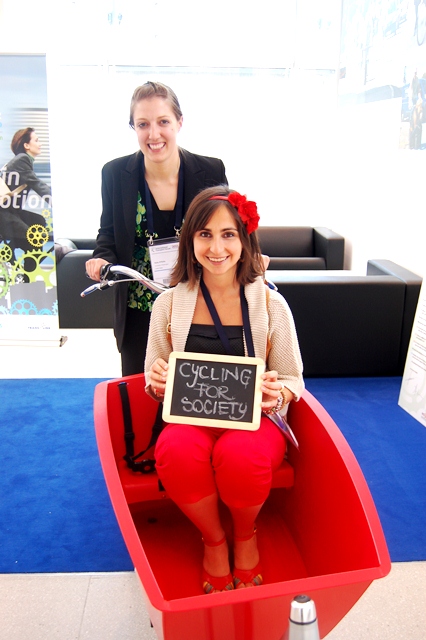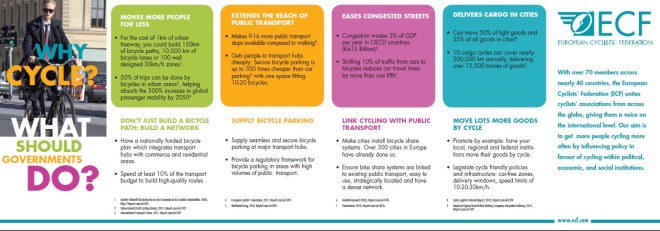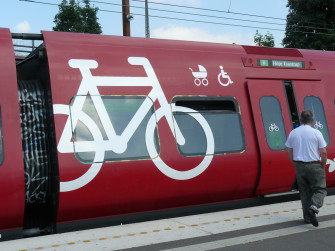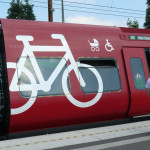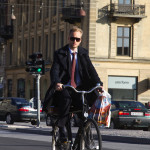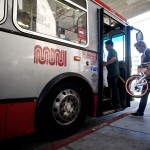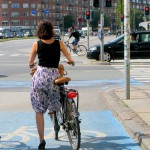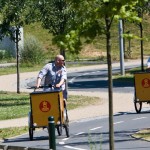
53 Ministers to Talk About Cycling: The International Transport Forum
 |
 |
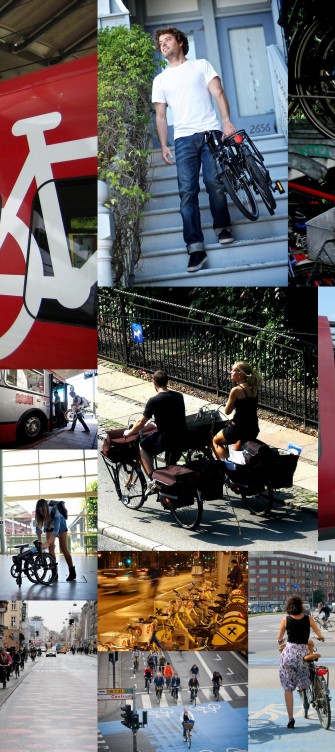 |
 |
|
|
(Monday, April 30) |
(Thursday, May 3) |
(Friday, May 4) |
We developed a series of articles for the ITF. You can click on the picture above to see them as soon as they're online. For Post-coverage of the ITF, click here
The International Transport Forum will be taking place in Leipzig next week, gathering 53 National Transport Ministers, the world’s leading thinkers, CEOs, politicians and academics to discuss transport. This year’s focus will be on “Seamless Transport”. ECF policy officer, Fabian Kuester, explains why it's so important for cycling to be heard.
Q: What's the International Transport Forum (ITF) All About?
For those in the transport world, the ITF is the must attend event of the year. It’s without a doubt the leading policy conference in the transport sector. It sets the agenda for tomorrow’s transport systems. And without a doubt, there’s big question on everyone’s mind: how can we move away from a singular focus on individual motorized transportation? And thanks to our hard work, an increasing focus on cycling. It even features in this year’s official program.
Just like the Film Festival in Cannes, this event is not just about the latest international films, it’s also about “seeing and being seen”. It’s all about networking. Transport ministers from 53 countries will come to Leipzig, CEOs from some of the worlds’ leading transport companies, renowned academics, journalists….and the European Cyclists’ Federation. That’s right. Cyclists will have a voice!
Make Sure You:
- Watch ECF President Manfred Neun talk during the summit on "Rethinking the Last Mile" on Wednesday, May 2 at (11:30-13:30 UTC). His talk will be streamed live and will be free to watch
- Download our "ITF Manifesto" which we'll be giving to the 53 Transport Ministers, and other participants at the event.
- Talk to us on our Social Media Channels, and post messages and videos via Facebook and Twitter (use the hashtag #ITFLeipzig). We'll make sure you're messages are displayed on large screens at our booth.
Q: Why is ECF going?
The first time we attended the ITF was in 2010 when the central theme was “Transport and
Innovation”. We realized back then that the only “innovative” solutions focused on e-cars, etc. There was next to nothing about innovative solutions in the world of cycling. Not even a mention of pedelecs and public bike sharing systems. These cycling products have been hugely successful with very little public funding. Two year later and the e-car has yet to have its breakthrough.
We also want politicians to take cycling seriously as a mode of transport. There’s an incredible gap in the mindset of transport ministers, and what actually matters to people’s everyday lives. Take for example cycling to work in an easy and safe manner. Minister’s didn’t’ think they should bother about cycling on the national level. It was at this moment when we decided to get involved at the summit.
Q: What messages is ECF bringing to the Transport Ministers?
When you talk about ‘Seamless transport’ (the theme of this years’ conference), there’s little doubt that cycling should be center stage! No other mode of transportation in fact can do more for integrated transport systems than cycling; and no other mode can do it with a positive balance when you take all investments and benefits into account. The whole world complains about high petrol prices, asking for state subsidies for commuters, we think that this is a really good chance for cycling. It’s time to stop investing huge amounts in yesterday’s transport systems that will get ever more expensive; instead invest in transport systems that actually offer solutions. What we therefore need is ‘biased transport spending’ towards active modes of transport so we can re-balance the system.
We’ve prepared a Manifesto which we’ll be handing to ministers which outlines some of our main points. Feel free to download it and spread the word!
Q: How is cycling a part of “Seamless Transport"
It’s all about the ‘first and last mile’. Take public transport for example: cycling massively extends the reach of public transport and therefore brings it many new customers. The "S-tog" in Copenhagen, a sub-urban light railway system, has more than tripled its number of customers with bikes in only three years when it decided to make bicycle carriage free of charge in 2009, attracting in total an additional 2.6 million travels on the S-train network in 2011.
Another way of integrating cycling and public transport is offering adequate bike parking at public transport hubs, introducing bike sharing and so on. This has repercussions for the economic performance of the public transport operator, eases congestions, improves air quality, and so on. Or take cargo deliveries: With people doing more and more online-shopping, more goods need to be delivered to home places. Carrier TNT has started to deliver cargo by bikes: it’s a lot cheaper than delivering by van, often faster in congested cities, and improves the urban environment. We believe 50 % of all light goods and 25 % of all goods in cities can be delivered by cargo bikes.
Make sure you listen to our President Manfred Neun speak in a Panel session on “Rethinking the Last Mile”. It will be streamed live and free to watch.
 About the Author
About the Author
Fabian Küster is a Senior Policy Officer at the European Cyclists’ Federation and is regularly following EU developments and legislation, liaising with key stakeholders. He has previously worked in Brussels for a German Member of European Parliament and the German Embassy. He has wealth of experience in and around the EU institutions, and is an expert in the EU policy field of bicycles
Photos
Resources
Contact the author
Recent news!
Upcoming events
Contact Us
Avenue des Arts, 7-8
Postal address: Rue de la Charité, 22
1210 Brussels, Belgium

